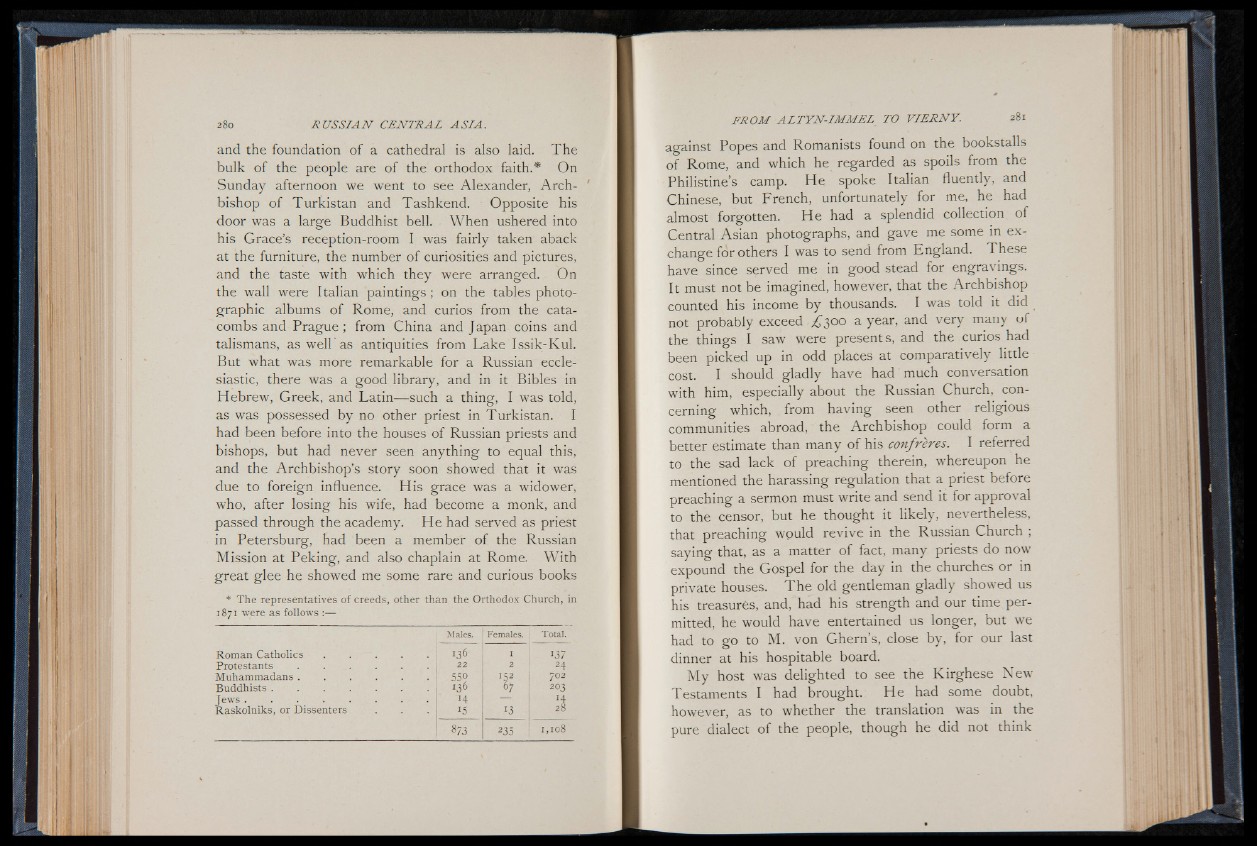
and the foundation of a cathedral is also laid. The
bulk of the people are of the orthodox faith.* On
Sunday afternoon we went to see Alexander, Archbishop
of Turkistan and Tashkend. Opposite his
door was a large Buddhist bell. When ushered into
his Grace’s reception-room I was fairly taken aback
at the furniture, the number of curiosities and pictures,
and the taste with which they were arranged. On
the wall were Italian paintings; on the tables photographic
albums of Rome, and curios from the catacombs
and Prague ; from China and Japan coins and
talismans, as well'as antiquities from Lake Issik-Kul.
But what was more remarkable for a Russian ecclesiastic,
there was a good library, and in it Bibles in
Hebrew, Greek, and Latin— such a thing, I was told,
as was possessed by no other priest in Turkistan. I
had been before into the houses of Russian priests and
bishops, but had never seen anything to equal this,
and the Archbishop’s story soon showed that it was
due to foreign influence. His grace was a widower;
who, after losing his wife, had become a monk, and
passed through the academy. He had served as priest
in Petersburg, had been a member of the Russian
Mission at Peking, and also chaplain at Rome. With
great glee he showed me some rare and curious books
* The representatives of creeds, other than the Orthodox Church, in
1871 were as follows :—
Males. Females. Total.
Roman Catholics . . . . . I 137
Protestants . . .... 22 2 24
Muhammadans . . . . . . 550 I52 702
Buddhists . . . . 136 67 203
J ew s . . . . . . H H
Raskolniks, or Dissenters iS !3 28
873 235 1,108
against Popes and Romanists found on the bookstalls
of Rome, and which he regarded as spoils from the
Philistine’s camp. He spoke Italian fluently, and
Chinese, but French, unfortunately for me, he had
almost forgotten. He had a splendid collection of
Central Asian photographs, and gave me some in exchange
for others I was to send from England. These
have since served me in good stead for engravings.
It must not be imagined, however, that the Archbishop
counted his income by thousands. I was told it did
not probably exceed ¿300 a year, and very many of
the things I saw were presents, and the curios had
been picked up in odd places at comparatively little
cost. I should gladly have had much conversation
with him, especially about the Russian Church, concerning
which, from having seen other religious
communities abroad, the Archbishop could form a
better estimate than many of his confreres. I referred
to the sad lack of preaching therein, whereupon he
mentioned the harassing regulation that a priest before
preaching a sermon must write and send it for approval
to the censor, but he thought it likely, nevertheless,
that preaching wpuld revive in the Russian Church ;
saying that, as a matter of fact, many priests do now
expound the Gospel for the day in the churches or in
private houses. The old gentleman gladly showed us
his treasures, and, had his strength and our time permitted,
he would have entertained us longer, but we
had to go to M. von Ghern’s, close by, for our last
dinner at his hospitable board.
My host was delighted to see the Kirghese New
Testaments I had brought. He had some doubt,
however, as to whether the translation was in the
pure dialect of the people, though he did not think